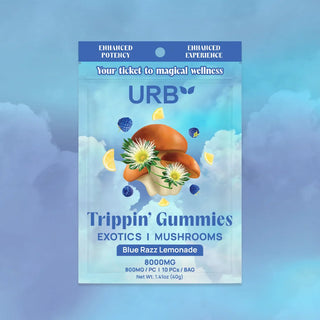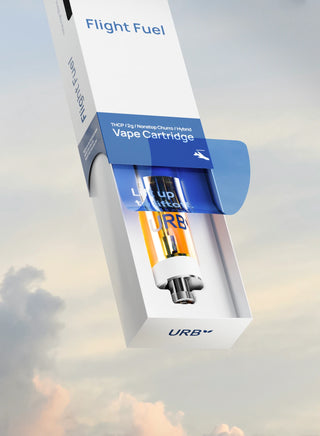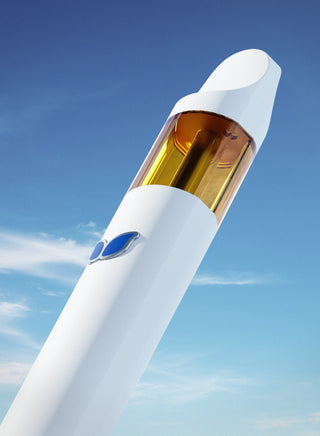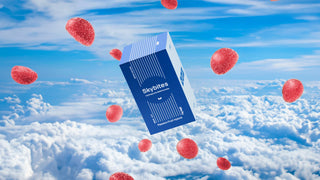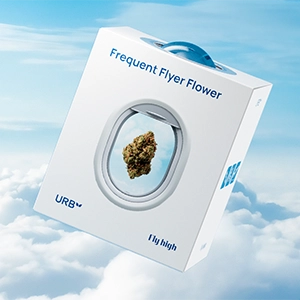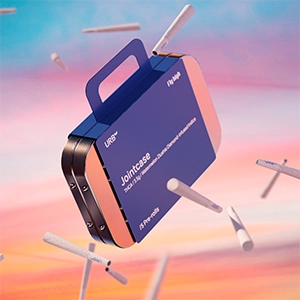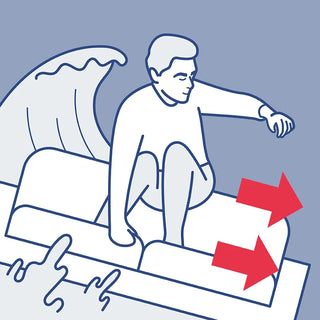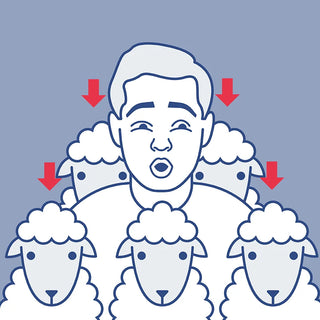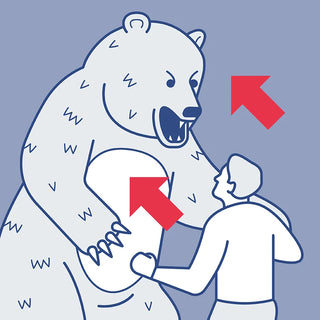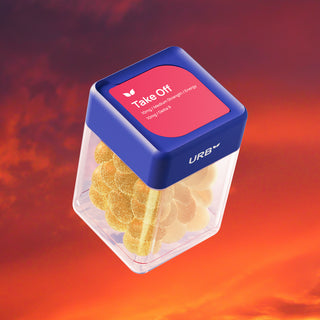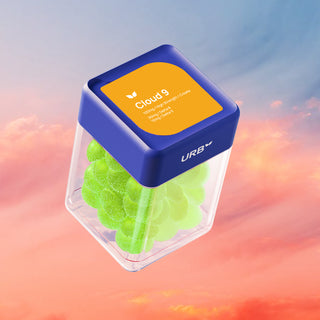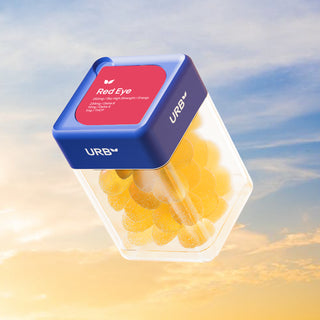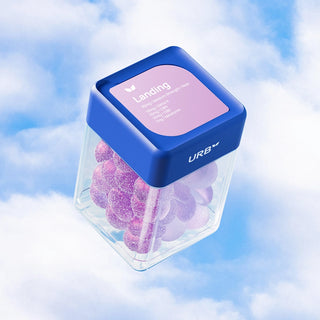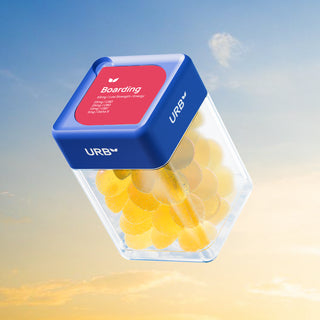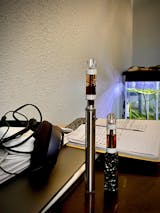They may look and sound alike, but do you know the difference? Here’s a hint: One is raw, non-psychoactive, and found in cannabis plants before heat is applied. The other is the well-known compound responsible for the psychoactive effects of cannabis. We’re talking about THCA and THC.
Knowing the distinction between these two is essential for anyone exploring modern cannabis, especially when it comes to how they show up in your body, your experience, and your product choices.
From chemical structure to legal nuance, this is your go-to resource for understanding what sets these compounds apart. Ready for lift-off?
THCA vs THC: At A Glance
THCA is the raw, non-psychoactive form of THC—essentially, cannabis before the heat kicks in. Once exposed to fire, vapor, or baking, THCA transforms into THC, the active compound behind the classic euphoric experience.
While THCA offers potential functional and wellness benefits in its natural state, THC delivers the classic psychoactive experience. The key difference? One stays cool and calm; the other lights up your receptors.
What Is THCA?
THCA (tetrahydrocannabinolic acid) is a cannabinoid found in raw cannabis. First identified by Professor Friedhelm Korte from the University of Bonn in 1965, it’s the chemical precursor to THC, the principal intoxicating compound in hemp and cannabis. What makes this potentially confusing is the relationship between the two. Are THCA and THC the same? No … and yes.

From one perspective, the question of molecular structure is the primary difference. But the other is just as important: THCA doesn’t produce psychoactive effects on its own. Why? Until it’s converted to THC through the application of heat, THCA can’t bind to the CB1 receptors in our endocannabinoid system, which are associated with such functions as motor control, mood and emotion, memory and cognition, and psychoactivity.
What Is THC?
THC (tetrahydrocannabinol) is the most abundant cannabinoid in cannabis, and the one most closely associated with its psychoactive effects. It imparts that unforgettable euphoria by binding directly to CB1 receptors in the brain, leading to altered perception and intoxicating effects. THC was first identified by Dr. Raphael Mechoulam, who decoded the chemical structures of THC and CBD in 1960, thus paving the way for all the advances in cannabis science that have followed since.
Raw cannabis contains very little THC, so while THCA and THC are chemically linked, THC is what delivers the effects most cannabis consumers are looking for, whether you’re lighting a joint, vaping a cartridge, or baking an edible. That heat unlocks THC’s true potential.
Want to get to know the THC family tree? Explore our guide to THC cannabinoids and how they interact with your body.
How THCA Converts to THC
THCA contains an extra carboxyl group. On its own, that group prevents the compound from fitting snugly into the brain’s CB1 receptors. But once THCA is heated—by flame, vaporizer, or even a hot oven—it undergoes decarboxylation, a chemical reaction that removes that carboxyl group.
What’s left? Delta-9 THC: the fully active, psychoactive version ready to engage your endocannabinoid system. So while THCA and THC may look similar under a microscope, the presence (or absence) of heat makes all the difference. Without decarboxylation, THCA stays inert. With it, you get the full experience.
Key Differences Between THCA and THC
Now that you know a little about the difference between THCA and THC, we’ll lay it all out in an easy-to-understand format. Here’s how these two crucial cannabis compounds differ.
|
THCA |
THC |
|
|
Name |
Tetrahydrocannabinolic Acid |
Tetrahydrocannabinol |
|
Psychoactive? |
No – Inactive in raw form |
Yes – Produces euphoric effects |
|
Found In |
Raw or unheated cannabis (especially flower) |
Heated cannabis (smoked, vaped, baked) |
|
Chemical Structure |
Contains an extra carboxyl group (–COOH) |
Decarboxylated (carboxyl group removed) |
|
Effects |
Being studied for functional support and wellness potential |
Known for psychoactivity: mood shift, altered perception, body effects |
|
Activation |
Converts to THC when exposed to heat (decarboxylation) |
Already active—interacts with CB1 receptors |
|
Legal Status |
Federally legal under the 2018 Farm Bill (watch for state-level restrictions) |
Must remain under 0.3% by dry weight in hemp products |
THCA and THC may be chemically connected, but their effects, roles, and uses are distinct. It all comes down to heat, timing, and how the body responds.
THCA vs THC: Effects Compared
When vaping or smoking THCA vs THC, since THCA instantly decarboxylates to THC in the presence of sufficient heat, they’re functionally equivalent.

In a very real sense, when you use cannabis products, you’re encountering both compounds. Here are some ways to understand the differing THCA vs THC effects:
-
THCA: Non-intoxicating when raw, it’s sometimes consumed in juices or raw cannabis products for potential functional benefits.
-
THC: Produces strong psychoactive effects, including euphoria and altered perception.
So can you compare the two? Technically, no, but practically, yes. If heat is involved, they’re part of the same ride.
THCA vs THC: Which Is Stronger?
Again, this is a question of semantics. THC is arguably “stronger” because it’s psychoactive, while THCA only becomes “strong” once converted. That said, some manufacturers have switched to sharing THCA percentages on labels as opposed to THC percentages. Here at URB, we use these two cannabinoids in effect-based blends to create highly potent, consistent, and tailored experiences.
Potential Benefits of THCA vs THC
As with many other cannabis compounds, potential THCA and THC benefits are currently under intense study. Some of the more promising areas of research include:
-
THCA: Intended for raw consumption, it may have a longer shelf life than THC in some forms; it is also being studied for potential anti-inflammatory and neuroprotective properties.
-
THC: Imparting a powerful euphoria for recreational enjoyment, THC has potential wellness uses when taken intentionally via various consumption methods.
Potential Side Effects: THCA vs THC
THC is generally considered a safe and well-tolerated compound. THCA, being non-psychoactive, is currently less studied, though that’s rapidly changing. As with all compounds, however, there is the potential for side effects. Some of the most common ones for both include:
-
Dry mouth
-
Altered perception
-
Anxiety
-
Fatigue
As with any cannabinoid, quality, purity, and dosage matter; that’s why the cannabinoid products we offer are derived from hemp using safe and federally compliant processes. We back it up with binding certificates of analysis (COAs), which are available at any time and serve as proof of our commitment to quality.
THCA, THC and Drug Testing
Given that it’s still a relatively unknown cannabinoid, many consumers wonder about THCA and drug test sensitivities. While drug tests are typically designed to screen for THC, consuming THCA (when heated) will result in THC in the body and will likely trigger a positive result. Even in its raw, unheated form, THCA can break down in the body into THC-COOH, the metabolite (or by-product) most drug tests are designed to detect.
If you’re concerned about an upcoming drug test, we recommend caution when working with THCA or other cannabinoids.
For a deeper dive, check out how long Delta-9 THC stays in your system.
Where to Find THCA and THC Products
As the major psychoactive cannabinoid, THC (and by extension its chemical precursor, THCA) appears in a wide range of products, from fresh flower and pre-rolls to THC gummies, vapes, edibles and beyond. Here at URB, we’re especially excited about our THCA Collection, powered by AAA exotic indoor-grown flower grown to the highest standards.
Looking for something sweet to try? Featuring our crowd-pleasing D9 gummies, URB’s classic THC Collection relies on the power of Delta-9 THC for consistent, potent, long-lasting effects. We really mean it when we say to “Fly higher with URB.” Whichever cannabinoid calls your name, you’ll find it here in our effects-based collections and blends.
New to the world of cannabinoids? Start your journey with our Cannabinoid Guide, a full tour of the wonderful world of cannabis compounds.
THCA vs THC: Two Cannabinoids, One Destination at URB
THCA and THC are closely related, but once heat enters the picture, everything changes. The process of decarboxylation converts inactive THCA into THC, the cannabinoid most associated with the cannabis plant’s psychoactive effects.
URB is all about leveraging the power of these essential compounds for our effects-based blends. With compliant sourcing, a dedication to transparency, and a focus on consistent and effective cannabinoid experiences, we’re proud to be a leading producer of hemp-derived products.
Curious about THCA flower or THC-rich blends? Explore URB’s trusted cannabis experiences today at urb.shop. Better yet, become a Frequent Flyer with the URB Mileage Loyalty Program.
THCA vs THC FAQs
What is the main difference between THCA and THC?
THCA is the raw, non-psychoactive form of THC. It doesn’t produce intoxicating effects until it’s heated. Once heat is applied, a process called decarboxylation, THCA converts into THC, the active compound responsible for cannabis’s euphoric effects.
Does THCA have psychoactive effects?
No. THCA is the inactive precursor compound to THC, the principal psychoactive compound in cannabis. It’s only when heat is applied that THCA transforms to THC.
Is THCA stronger than THC?
No. THCA is non-psychoactive in its raw form, while THC delivers the intoxicating effects commonly associated with cannabis. THCA serves as the precursor to THC and must be heated to convert into its active, psychoactive form.
Which cannabinoid is best for beginners: THCA or THC?
While THCA and THC sound like two different compounds, on a functional level, they’re the same: THCA is converted to THC by heat. Because THC is psychoactive, it should be approached with caution.
Why is THCA legal and not THC?
Thanks to the 2018 Farm Bill, raw cannabis or hemp compounds that contain 0.3% THC by weight or less are federally legal. Since THCA isn’t technically THC, this allows it to be sold in states that permit hemp sales.
